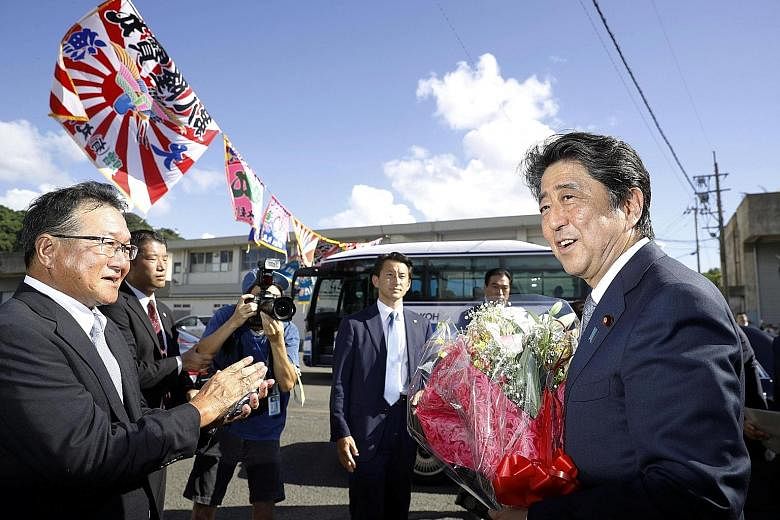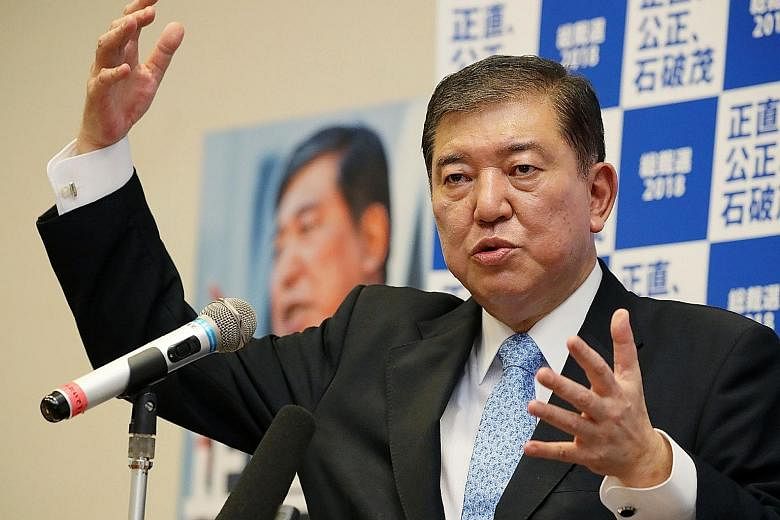Prime Minister Shinzo Abe pointed to the stability that his leadership has brought Japan since he took office in December 2012, as he confirmed yesterday that he wants another three years at the helm.
Japan faced political upheavals between 2006 and 2012, with a revolving door of six prime ministers until Mr Abe took power, and he suggested that a change in leadership at this juncture is not ideal in what is a "historic turning point" for the country.
He made the remarks as he confirmed to reporters that he will contest a party leadership election on Sept 20 in what is shaping up to be a two-horse race between Mr Abe, 63, and his former defence chief Shigeru Ishiba, 61.
Whoever wins will be Japan's de facto prime minister, as the ruling Liberal Democratic Party (LDP) and its coalition partner Komeito hold an overwhelming majority in Parliament. And if Mr Abe wins, he will be on track to become Japan's longest-serving prime minister.
Mr Abe's government was returned to power in a landslide in a snap election last October.
Yesterday, he said that next year will mark the end of the Heisei (achieving peace) era with the abdication of Emperor Akihito next April, and that stability is crucial as the country enters a new era.
Japan is also due to host upcoming major events, including the Group of 20 Summit and Rugby World Cup next year, and the Olympic and Paralympic Games in 2020.
"As we prepare to welcome a historic turning point, what kind of country we want to create will be a contentious issue," he said.
"I am determined to steer Japan in a new era."
Analysts say Mr Abe, whose three-year tenure as party chief will expire next month, is the shoo-in to win what would be a rematch of the 2012 election. The term limit for the LDP leader was last year extended from two consecutive terms to three.
In 2012, Mr Abe prevailed due to his support among parliamentarians, edging out Mr Ishiba who is seen as a salt-of-the-earth leader with robust support among the party's local and regional chapters. There was a walkover in 2015.
The Prime Minister had survived allegations of cronyism that at one point pushed his public approval ratings below the "danger zone" of 30 per cent.
The latest Kyodo public opinion poll released yesterday showed that 36.3 per cent of respondents supported Mr Abe as LDP leader, with Mr Ishiba polling 31.3 per cent. Mr Abe has secured the backing of five of the LDP's seven factions - accounting for about 70 per cent of the party's lawmakers.
His announcement came after Mr Ishiba last Friday told a news conference that he will enact laws to reinvigorate Japan's ailing, depopulated regional areas should he win. He had criticised Mr Abe for focusing on the urban areas first.
The two candidates will also clash on the plans to revise Japan's pacifist Constitution for the first time since it came into force in 1947.
Mr Ishiba has accused Mr Abe of making cosmetic proposals that the public might find easier to stomach in his rush to achieve his goal of rewriting the supreme law of the land, saying that the public still lacks understanding.
"Abe is kind of an unstoppable force at this time," Dr Jeffrey Kingston of Temple University, Japan told The Straits Times. "Ishiba has to get Abe on his biggest Achilles' heel, but Abe has survived a series of scandals - any one of which would have brought down a previous prime minister."


